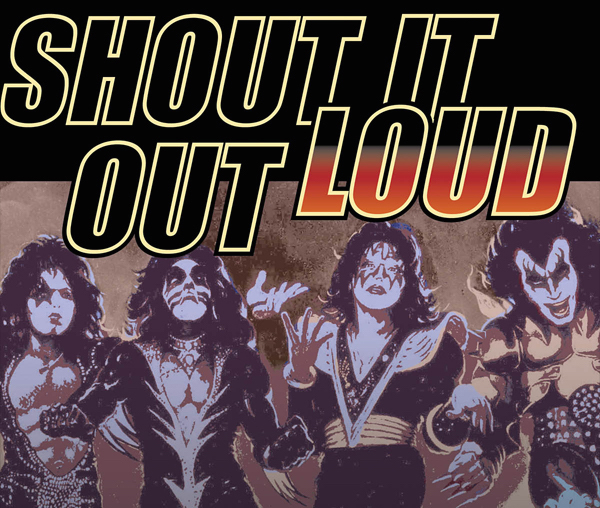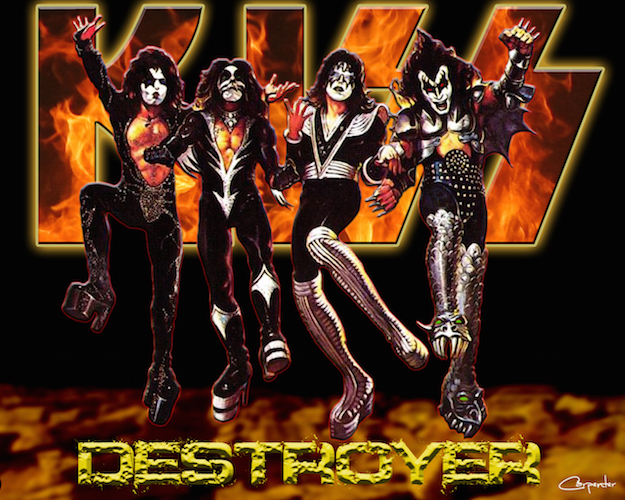Book Review: “Shout It Out Loud” — KISS and Sell
Shout It Out Loud begins as a forensic examination of KISS’s Destroyer album, but it ends up as more than a book about an album, the group, or even the metal tributary of ’70s rock.
Shout It Out Loud: The Story of KISS’s Destroyer and the Making of an American Icon by James Campion. Backbeat Books, 400 pages, $24.99.

By Vince Czyz
The first rock album I ever listened to was Alive!, which my older brother had brought home and I sneaked out of his room to listen to whenever he wasn’t around. I wasn’t just mesmerized by the fantastic figures wielding guitars and drumsticks; I loved the music. The first LP I ever owned was KISS’s next release: Destroyer. I still recall a friend sitting me down at a party of eighth-graders to listen to this bad-ass, new song “Detroit, Rock City.” By the time I was fifteen or so, I had covered sixteen square feet of the wall behind my bed with a KISS poster, a medley of concert scenes—close-ups, solo photos, group shots. Painful as it is to admit in print, I fought for KISS in the ever-popular, high school debate over whether KISS or Led Zeppelin was the better band.
I haven’t been a KISS fan for decades—probably since I ditched my cap and gown after graduating from college. I still enjoy hearing the occasional KISS tune on the radio, but I no longer have any of the vinyl albums I collected, and only three or four of their later hits made it to my MP3 player. I came to consider them a mediocre band at best—the inane lyrics, the lack of musicianship—comic-book characters who reached stratospheric heights through hype, stage antics, and teen power. So I wasn’t expecting more than a fling with my distant adolescence when I picked up James Campion’s Shout It Out Loud, subtitled The Story of KISS’s Destroyer and the Making of an American Icon.
The book, as it turns out, is better than the band. I’m not widely read in music journalism, but this is one of the best efforts I’ve come across—easily better, for example, than Dave Marsh’s rather disappointing Springsteen bio Born to Run.
Campion takes pleasure in minutiae, in detailed descriptions, and his high-energy style reflects both the music and the mood of the ’70s. Here’s how he places KISS in rock chronology: “These were the freshly minted faces of rock and roll’s third generation; the mutated offspring of the 1950s teen-consumer monster that shed the post-war dirge for a sock-hop, greasy stroll on the sexual side of the Caucasian blues and the direct descendants of the 1960s’ acid-crazed fade of the Woodstock echo.”
Meant for the general reader as much as for the hardcore fan, Shout It Out Loud covers the band’s beginnings, reminding us that two guys playing for loose change on a corner in Greenwich Village—Paul Stanley and Gene Simmons—put together one of the world’s most successful rock bands. That success peaked, not financially but artistically, with the Destroyer album — Campion, and a consensus of critics, agree. This is the book’s focal point, the making of their fifth album, for which they hired production wunderkind Bob Ezrin, who’d launched Alice Cooper to the forefront of American rock.
Up until Destroyer, KISS rushed through their work in the studio and put all of their money and effort into their over-the-top road show. But those albums didn’t sell nearly well enough to justify the expenses the band was racking up: Destroyer was a make-or-break gambit. Bill Aucoin, KISS’s flamboyant manager, was out of money, and fledgling label Casablanca was so broke it had yet to pay KISS long-overdue royalties.
Ezrin set up “boot camp” in New York’s legendary Record Plant recording studio, demanding more of the boys and pushing them harder than anyone ever had. He also got his fingerprints all over the music, receiving writing credits on seven of the nine songs and—classically trained and himself an accomplished musician—bringing in a piano, choir boys, and orchestral strings—strings for a heavy-metal band whose bassist was famous for spitting blood and breathing fire on stage! Oh, and a calliope (essentially a carnival organ). Campion feverishly details these recording sessions, the alchemical reactions between band members and Ezrin, the drug and booze abuse (Ace Frehley was so frequently AWOL and drunk that session guitarist Dick Wagner took over on three or four songs), Simmons’s insistence on treating himself (and anyone else interested) to prostitutes, the methods used to lay down and loop tracks to create different effects in the analog age, microphone placement, and other technical aspects that I, a non-musician, nonetheless found fascinating.
Campion quotes exhaustively just about everybody involved—PR guys, Casablanca execs, sound engineers Jay Messina and Corky Stasiak (who would go on to work on many other milestone albums), DJ Scott Shannon, Ezrin, other music critics, the album cover artist, and even the guy who came up with the title for the album. One criticism that might be raised is that Campion doesn’t conduct fresh interviews with the band members themselves. What he does instead is pull extensively from their autobiographies and previous interviews and deftly place these quotes so that the reader really doesn’t miss a thing. In reality, Campion should be commended for finally talking to participants who have essentially been ignored for decades and seamlessly fusing their testimony with that of the Stanley, Simmons, & co. to create a holograph of multiple perspectives rather than a flat photo.
What I particularly enjoyed about this book is that Campion is an apt cultural commentator. He makes incisive observations about the music itself, the ’70s, the industry, American culture, and consumer capitalism. Whereas many critics simply dismissed KISS as “shameless exhibitionism,” Campion digs deeper: “KISS created an otherworldly alternative to the harsh realities of a broke and corrupt metropolis ravaged by violence, crime, and apathy, not unlike contemporaries the New York Dolls but with an all-out blitz of showmanship.” KISS, Campion maintains, was quintessentially American, and evolved not “from the twelve-bar or the British invasion, the coffeehouse troubadour or the art house drop-out, but from horror films, comic books, B-movies, Playboy, strip clubs, glamour magazines, and Disneyland—in other words, modern Americana.” There was nothing particularly redeeming behind the music. “Unlike the spate of socially conscious counterculture acts and the newly minted, self-important ‘prog[ressive] rock” that dominated the early 1970s music scene, [KISS] had no political agenda nor felt the need to front or ride a movement.” As Ace Frehley put it, “It was always about money.”

The analytical side of Shout It Out Loud and the descriptions of KISS’s music remind me of Greil Marcus’s magnum opus, Lipstick Traces, A Secret History of the 20th Century, which looks at some of the social undercurrents of the last century through the lens of The Sex Pistols and punk rock—a book, incidentally, on my all-time-favorite-50-books list.
Shout also contains several sidebars that I found riveting, such as how Kim Fowley, whose own band burned and disintegrated in the airwaves, got two co-written songs onto Destroyer. His story—hustling in parking lots to spark something with other musicians and writing lyrics on a napkin during a ride back from an airport and touting it (correctly) as his retirement account—is worthy of a small book of its own. Deftly detouring us into the world of comics and fantasy novels, a realm with which KISS intentionally overlaps, Campion also narrates the story of Ken Kelly, a comics cover artist who works three jobs to keep a tiny flat where the living room doubled as his studio. Nephew of legendary fantasy illustrator Frank Frazetta (a poster of his work was on another of my bedroom walls throughout high school), Kelly got the nod to do the now-classic Destroyer cover through a curious intersection of talent, hustle, timing, and pure chance. Suddenly, Kelly had a career, not to mention a down payment for a house. And then there is the extended play Campion gives to Alice Cooper—where they fit into the rock scene, how Ezrin altered the band’s course, and how it ultimately inspired KISS itself.
There are times when Campion’s writing overshoots the basket and soars over the backboard, when the language seems to outstrip the music itself (I youtubed songs I hadn’t heard in a decade or two and yes, sometimes Campion’s descriptions outperform them), but these moments are few and forgivable. On the whole, Campion is a critic who understands music the way a musician does, and his writing illuminates technical aspects that would otherwise be hopelessly murky to the reader (like me) who doesn’t know an E sharp from a B flat.
Shout begins as a forensic examination of KISS’s Destroyer, but it ends up as more than a book about an album, KISS, or even the metal tributary of ’70s rock. It’s a testament to music, how it’s engineered, and how social phenomena crystallize and snowball; it’s about youth, collective archetypes, and tapping into them; it’s about America the Disaffected, entertainment, pop culture, and escapism. And if you heard KISS growing up and still remember shrink-wrapped albums and cover art worthy of a wall, it’s about you.
Vince Czyz is the author of The Christos Mosaic, a novel, and Adrift in a Vanishing City, a collection of short fiction. He is the recipient of the Faulkner Prize for Short Fiction and two NJ Arts Council fellowships. The 2011 Capote Fellow, his work has appeared in many publications, including New England Review, Shenandoah, AGNI, The Massachusetts Review, Georgetown Review, Quiddity, Tampa Review, Boston Review, and Louisiana Literature.
Tagged: Backbeat Books, Destroyer, James Campion, KISS, Shout it Out Loud
